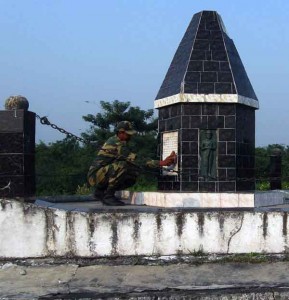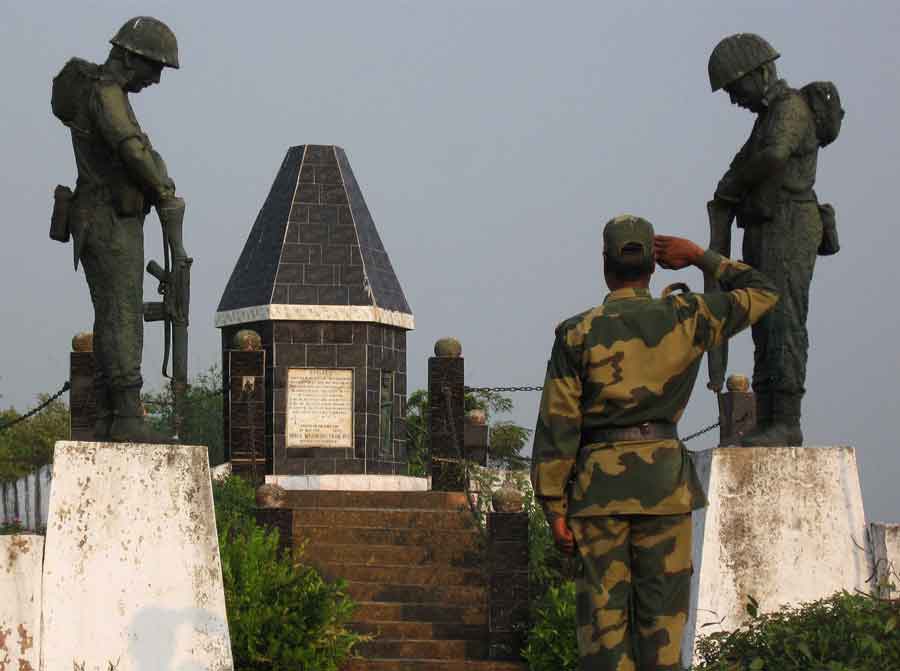
A BSF Soldier is saluting Epitaph to pay homage to his three senior colleges (Photo: Shib Shankar Chatterjee)
Inmates of the Border Security Force (BSF) of Khalpara International Border Out Post (IBOP) have been facing a number of unwanted incidents for a long time. This came to light after an incident that took place at the aforesaid BSF camp that lies on the India-Bangladesh International Border under Haldibari Police Station at Jalpaiguri District in West Bengal. The jawans of the Khalpara IBOP have been noticing that a number of snakes are moving within the camp area. This has caused anxiety among the jawans and they have got frightened. The snakes vanish when jawans try to drive the snakes out, but reappear again after sometime. As a result of this, they have to pass many a sleepless night.
“One night, one of the guards, when he was on duty, felt that someone had been slapping him. The other guards also agreed to his story of an invisible man, who was slapping some other guards. This happened when they show negligence towards their duty (basically at night),” claimed a constable of 95 BN of BSF, Prakash Singh
“On June 8, 2009, Pravin Kumar, one of our Santris (that is a guard) of the camp noticed a number of snakes loitering in the camp areas. Others inmates and I also saw them. At once, we took steps and drove the snakes out. But, we can’t stop the snakes from coming into the camp. The snakes come again and again and have caused a sense of fear among all of us. We have tried our best to clear up the snakes but in vain. Such incidents have occurred repeatedly”, revealed Sub Inspector Sunderlal Singh, the Platoon Commander of 95 Number Battalion, who was in-charge of the aforesaid IBOP on October 20, 2009.
Apart from this incident, the jawans have also witnessed some strange incidents, which have created a great fear among the jawans of the Khalpara IBOP. “One night, one of the guards, when he was on duty, felt that someone had been slapping him. The other guards also agreed to his story of an invisible man, who was slapping some other guards. This happened when they show negligence towards their duty (basically at night),” claimed a constable of 95 BN of BSF, Prakash Singh, who was posted at Dangapara IBOP initially, Sunderlal Singh did not believe in all those stories. He didn’t pay heed to the prevalent custom. So, he neither lighted up any candles nor burnt any incense sticks at the martyrs’ altar. As a result, these unwanted incidents started to occur there. At last to mitigate the problem, Sunderlal started to do all that was in practice. He began to light up the candles and burn incense sticks at the martyrs’ tomb. Not only that, he also ordered all camp inmates strictly that nobody should show any negligence to their works during the duty period in that particular Khalpara IBOP. This helped solve the problem at the camp. But, the people of this area neither believe nor disbelieve. According to some of them, these are imaginary stories, while others say that there may be truth in the stories of Sunderlal or Pravin Kumar. But, the jawans still believe in all the incidents that take place, whenever there is any lapse during the duty hours in the camp.
In fact, during the Liberation War, 1971, three jawans had become shahid in this particular Khalpara IBOP. In the evening of August 11, 1971, those who were killed by a bombshell of the army of erstwhile East Pakistan were from the 73 Battalion of BSF. They were Head Constable (Number—66733027)—Anil Kumar Sircar, Head Constable (Number—66733112)—Mohini Mohan Roy and Constable (Number—66733522)—Man Bahadur Rai.
“It was around 05:00 pm; suddenly, we found a jeep appearing on the other side of the international boundary and about three to four soldiers of the then East Pakistan Rifles (EPR) came out of the jeep. They were carrying mortar shells upon their shoulders and then they kept them on the ground. After sometime a fireball dropped on the ground flying from a little distance. We got astounded and ran to a safer place. These EPR soldiers also visited this place in the early morning, around 08:00 am”, said one of the eyewitnesses, Ashok Roy, who was 7 years old and used to live at Khlapara hamlet.
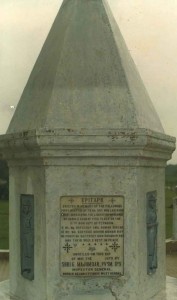
BSF and the village people have made this Epitaph in the memory of their beloved soldiers (Photo: Shib Shankar Chatterjee)
“…Our house stood just 250 yards to 300 yards away from the actual international borderline between India and the erstwhile East Pakistan. Like other days, that day also, I went to bring jute sticks, which were lying beside a nearby field. Then, while I was returning from the field unexpectedly, I heard unstopped firing. I saw volleys of bullets coming from the guns triggered by the EPR soldiers from across the international border. Hearing and seeing this, I rushed to my home. While going to my hut, I saw a BSF jawan fallen on the ground with a bullet injury and other jawans were busy in carrying away another injured jawan to their camp. Then just after a few minutes I heard another terrible sound but couldn’t see it properly. In the meantime, I had already entered our courtyard, but I was feeling warm in the right side of the waist. I found that a lot of blood was gushing out profusely from my waist. At once I cried out in fear and fell flat on the ground. When the family members saw my serious situation, they at once took me to the Haldibari Sanatorium and subsequently shifted me to the Jalpaiguri District Hospital. After this, I do not know, what happened,”. But, after a month, when I recovered from this serious injury and returned to my home from the hospital, I came to know that three BSF soldiers of the Khalpara IBOP had lost their lives and their camp was totally burnt down by mortar shelling of EPR soldiers side,” another eye-witness Charan Dashi Mondol narrated the bloody incident. He was about 14 years old at that time and is now 55 years old and resides at Khalpara village of Jalpaiguri District, which lies on the Indo-Bangla international boundary.
Supporting the facts, 76-year-old Sumitra Roy, mother of Ashim Kumar Roy recalled, “Like other days, that day also, we were drying our clothes in the courtyard of our hut, which was stood just on the actual international borderline (which is called ‘Zero Line’) between India and the erstwhile East Pakistan. But, when I was sweeping the courtyard of our house, suddenly, we heard a terrible sound, which shocked the area and subsequently we saw a fireball dropping on our roof-shed. And at once, our house caught fire and began to burn with leaping flames. Not only that the area was covered by smoke and the villagers were running here and there to save their lives. We also fled from the house with other inmates and then within few seconds of this incident, another ball of fire dropped on an adjacent BSF camp and burnt the same into ashes. We rushed to the camp and found three numbers of BSF jawans lying dead there. We cannot forget that incident of day.”
“In 15 to 20 minutes some BSF jawans in cars came to our village and cordoned off the area without any loss of time. We at once reached there and found that the BSF camp that lay there burnt into ashes and the grass of that spot turned black, having been burnt by the fire. We also found that the bodies of three BSF personnel lying dead there. They took away the bodies from the spot. The scene still floats before our eyes, when we think of that day”, said Naren Sarkar, resident of Khalpara hamlet.
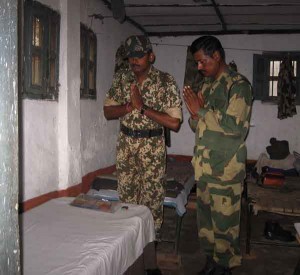
BSF Soldiers still pay homage to their senior colleagues daily. They always keep this (in picture) bed free to their dead colleagues. (Photo: Shib Shankar Chatterjee)
“At that time, I was a four-year-old boy, now I am 45. Around 3 pm, I was playing football in a nearby field (beside the actual international borderline, between India and the erstwhile East Pakistan with my friends and my sister was reading in the courtyard while my mother was drying jute in the sun. Our house stands just on the Zero Line. About 5 pm when we had almost completed our playing football, unexpectedly, I heard a terrible sound and saw our house was burning and everybody was running here and there for a safer place. Seeing this, I also began to run for a safer place”, divulged Ashim Kumar Roy, who had a house on the Zero Line and the house has now shifted inside the Indian territory after erecting the International Barbed Wire Border Fencing (IBWBF) on the aforesaid international boundary in the year 1993.
“Look, first EPR soldiers burnt down the Dangapara IBOP at Dangapara village near Chilahati under Domar Upazila in Nilphamari District of of East Pakistan, which was situated just near the IBPN—782 and as a result of this, EPR withdrew their soldiers. Later in retaliation, the EPR soldiers visited the Khalpara IBOP from their side (that is East Pakistan) in the early morning around 08:00 am in a jeep. Suddenly, at about 4:30 pm, some mortar shells had been fired by EPR soldiers with three numbers of vehicles and then they again started shelling at about 5:30 pm from around 800 metres to 900 metres away from the actual international borderline (near Dangapara village, where EPR’s Company Headquarters was situated) and left the place. After a little while, I saw about 16-17 soldiers of EPR who came once again and set rest of huts of our village on fire, Khalpara, which were not affected by their shelling,” pointed out 78-years old a Mukti Joddhha (that is a warrior), Balaram Dutta, who was associated with Mukti Bahini during the Liberation Movement of Bangladesh in 1971 and at that time his age was around 33 years old and was living at Pabna Colony, Ward Number 6 under Haldibari Municipal Board.
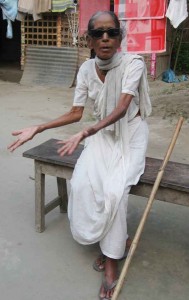
Sumitra Roy narrating the incident, when her house was burnt down by the East Pakistan Rifle force (Photo: Shib Shankar Chatterjee)
“I was on duty at a nearer IBOP, Hudumdanga, which is just three kilometres away from Khalpara IBOP. It is a fact that there was a heartrending sound. When I heard it and subsequently rushed to the spot, in the meantime, everything had finished off. Our colleague-cum-brother soldiers had died.”
“Today, we are free from all these bloody scenes because we are living at least inside around 200 yards of the International Border and Bangladesh got freedom and Pakistan is no more on this side. We are happy, but commemorating the day for our brave soldiers, who died to save our motherland and to commemorate the three shahids the inmates as well as the populaces of this Khalpara village area built this Shahid Bedi (that is Martyr Tomb) in the name of the aforesaid soldiers to show honour to those soldiers. Since then, it has become a practice to light up this martyr tomb and burn incense sticks to show love and respect to those honourable martyrs. Not only that, if any soldier is found negligent towards his duty he also faces the same situation”, disclosed one Naren Roy, who was working with BSF at that time and his age was around 31 years and was living at Khalpara village.




